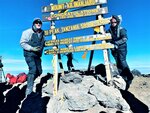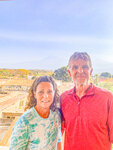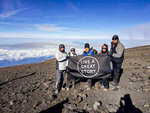


With their heads — and bodies — above the clouds, retired Lipan ISD educators officially reached new heights on their latest adventure.
Husband-and-wife duo Ted and Debbie Williams recently returned from a trip to Tanzania, a country in East Africa, where they climbed to Uhuru Peak on Mount Kilimanjaro.
Elevated at 19,341 feet (about twice the height of Mount St. Helens), the snow-capped volcano is the tallest mountain on the African continent and the highest free-standing mountain in the world, according to worldwildlife.org.
The decision to summit Mount Kilimanjaro came after Debbie retired as a technology teacher at Lipan ISD this past year. Ted had already been retired from Lipan ISD after 15 years as a biology teacher.
“We’re both certified health teachers too,” Ted said. “We’re both health nuts.”
“Staying active, physical and trying to do everything,” Debbie said. “We travel. That’s our main idea when we retired, we wanted to travel, and Kilimanjaro has just been on the bucket list for forever.”
Ted and Debbie, who have been married 44 years, have traveled to Hawaii, South America, Europe and Asia several times. This was their third time traveling to Africa.
“We don't have any grandkids. We don't have any horses. We don't have any motorcycles. We don't have boats. We don't play golf,” Ted said. “So, our extra money goes to airplane tickets. We don't do very many road trips. Some people say it is the journey to get there, but sometimes we're just getting there and then the journey begins, so we're a little bit different that way.”
“People think we're crazy in the things we do, but we've been blessed with a sense of adventure, and good health, so we just want to get out there, explore and see it all,” Debbie said.
And that, they did.
PREPARATIONS
Debbie and Ted booked their trip to Mount Kilimanjaro a year ahead and began training in January by hiking on several different terrains and mountains.
Their first multiple-day strenuous hiking trip was in July to Mont Blanc — Europe's highest peak — through the French, Italian and Swiss Alps.
Debbie and Ted climbed Guadalupe Peak, the tallest mountain in Texas at 8,700 feet, and walked the three-mile loop around Carlsbad Caverns in New Mexico twice.
They also walked along the 8-mile trail at Mineral Wells State Park and climbed Enchanted Rock, the second-biggest rock in the world, located near Fredericksburg.
"It's 800 feet up, so we climbed up there, climbed down, ate a little breakfast, climbed up, climbed down, and there's about a 6-mile loop all the way around it, so we did that twice,” Ted said.
Ted and Debbie walked, hiked, swam and lifted weights every other day to build up their stamina and endurance to be able to climb Mount Kilimanjaro.
“We trained a lot — a whole lot,” Debbie added.
THE CLIMB
The guides that Debbie and Ted picked to assist them in their climb had a higher success rate and had a slower climb than many of the others offering those services.
“You can take groups that will take just four days to get up, or five days, or six days,” Ted said. "Our trip was eight days. The longer you take, the better you can acclimatize.”
Their trek started around the first of October, and Debbie and Ted had to get used to the slower-than-normal pace.
“We were following the guides, and (they) set the pace. We just had to keep up with (them),” Debbie said.
“Our hiking pace is about four miles an hour, but most of the time we went one mile an hour or less, so it's just like you're walking in slow motion,” Ted said.
One of the Swahili phrases that Ted and Debbie learned quickly was “Pole, pole,” which means “slowly, slowly.”
Out of their group of 12, only five made it to the top of the mountain, including Ted and Debbie, who were the oldest at 66 and 64.
Many of the climbers suffered effects from the extremely high altitude, like an upset stomach and disorientation.
“You never know because of the altitude how it's gonna affect people, and some of the younger ones that we thought would be just fine got sick, so they couldn't make it all the way,” Debbie said.
According to worldwildlife.org, approximately 25,000 people attempt to summit Mount Kilimanjaro annually, but only two-thirds are successful.
Ted said the altitude wasn’t the key issue for some of the climbers though — it was the strenuous physical activity.
“Two people only made it the first two days, so it wasn't the altitude for them; they just didn't train properly,” he said. “People don't really take it seriously enough.”
He said four of the climbers made it to Stella Point, one of three official summit points on Mount Kilimanjaro. It’s situated at the edge of the crater rim.
“That's where most people turn around, because it's already at nearly 19,000 feet, and it's another hour to get to the tallest point. It took us an hour and a half to get there,” Ted said.
Finally, after eight days of climbing in 16-degree weather and carrying a 20-pound backpack filled with clothes, snacks, water and rain gear, Debbie and Ted finally made it to the top of Mount Kilimanjaro.
THE VIEW
Making it to the top of Uhuru Peak, Debbie said, was an emotional experience for all five of the climbers in their group
Ted compared the view to that of “the moon or Mars.”
“You're way above the tree line, and there's nothing except rocks and dirt,” he said. “You're way above the clouds and there were glaciers, so it was pretty clear, with zero rain.”
The hardest part when they were at the top, Ted said, was the zero-degree weather and the 30-to-40-mile-an-hour wind chill.
"We got up there at 8 a.m., and there were approximately 200 other people up there trying to get their picture with the sign. It was just bedlam,” he said.
CHALLENGES
The hardest part of the ascent for Debbie, she said, was being without running water and electricity, while Ted struggled the most with the mental challenges of the climb.
“I'm assuming it's mental, because we're in the best shape of our lives. We're ex-marathoners and triathletes,” Ted said. “But for all of these days here, you're seeing it. It looks like it's 100 miles away and 100 miles up. And you go, ‘Wow, we still got to get … close enough to make it,’ so like, it plays on your mind.”
Thanks to the prescription drug, Diamox, Debbie and Ted did not suffer any altitude sickness and were the only climbers who didn’t get injured, sick or sore during their trek up the mountain.
PORTERS
Climbing to the top of Mount Kilimanjaro is a great accomplishment in itself, but would be almost impossible without the help of the porters — dedicated men and women whose job it is to help tourists carry their gear to the summit.
Fifty porters helped Debbie and Ted’s group, including five guides, three head guides, two cooks, two waiters and two restroom attendants.
"It was so funny, because we would be at camp and get our gear ready, and we would leave," Debbie said. "They would stay behind, break down camp, and then they would pass us along the trail. They would get to where we were going and have it all set up by the time we got there."
“They carried all their stuff — most of it was on their head — they carried our big stuff, our 32 pounds, on their head along with the tents, the bathroom stuff, the food and the water,” Ted said.
“You become kind of a little family after a while with everybody,” Debbie said.
‘BLESSED’
The climb to the top of Mount Kilimanjaro was difficult and challenging, but Debbie said they are blessed they were able to make it to the top.
“We didn't know if we could make it or not, because all these other people were getting sick, but we did,” Debbie added. “We feel very fortunate and blessed that we were able to.”
Debbie and Ted have a plan to travel to several other places, including New Zealand and Europe. They may not have all their next adventures planned out, but they are sure of one thing — whatever they do, they will stay active.
“We've known teachers who retire, and they don't have any hobbies or anything to do, and they just kind of dwindle and go downhill. We have motivation from family members to keep moving and stay healthy,” Ted said. “This is one of God's best creations — that's why we like to get outside is because he created it all for us to enjoy. You've got to set goals, whether it's daily, weekly or for your life.”